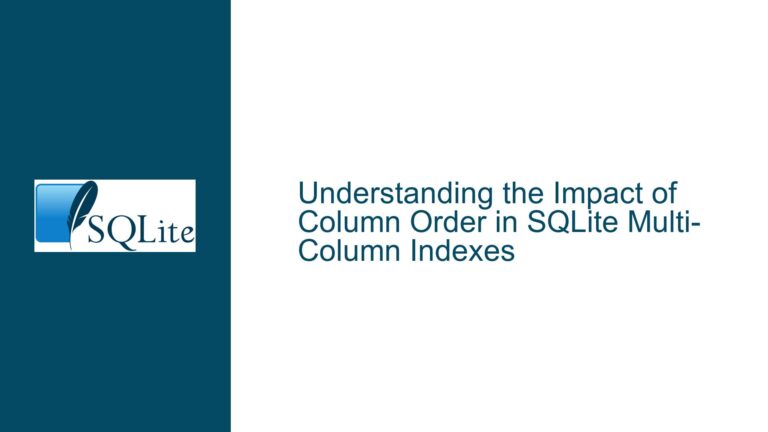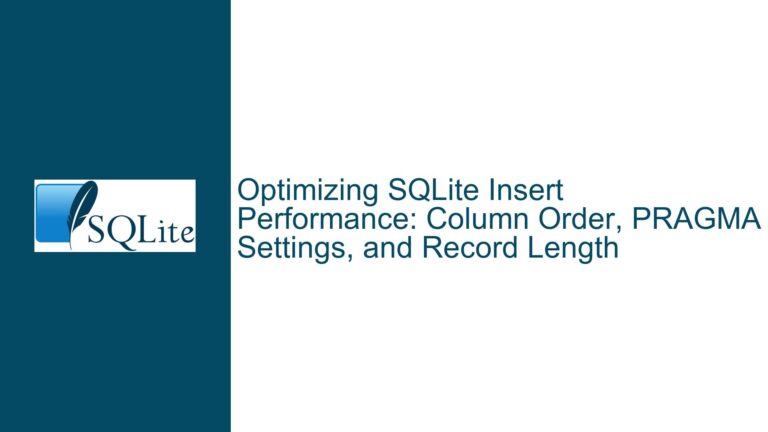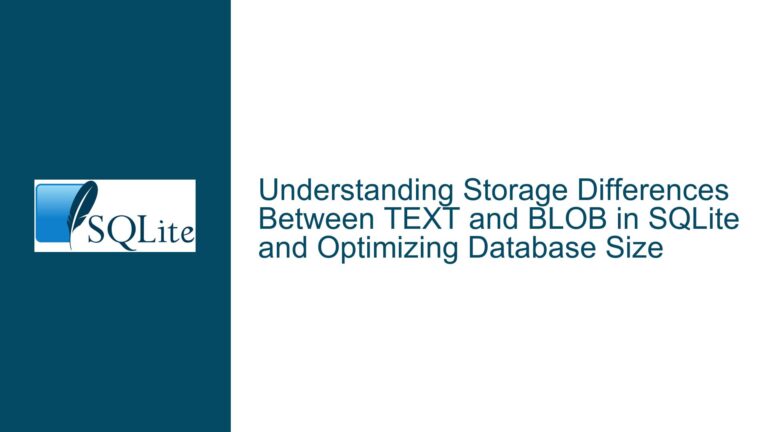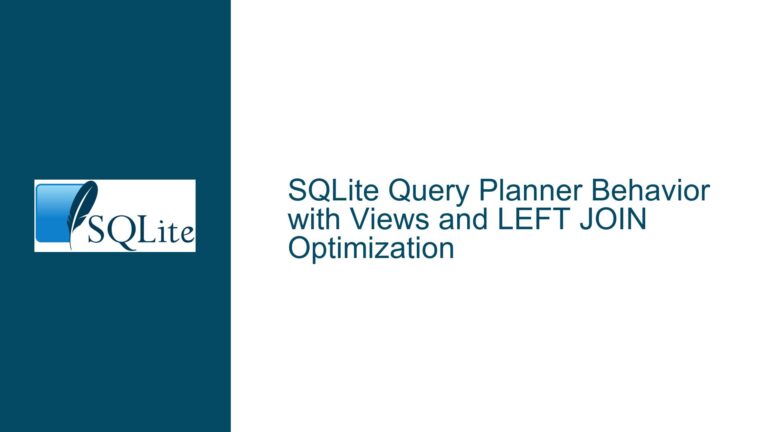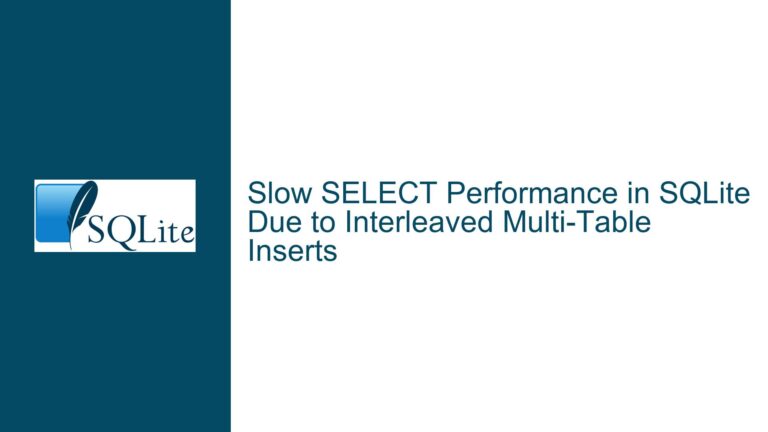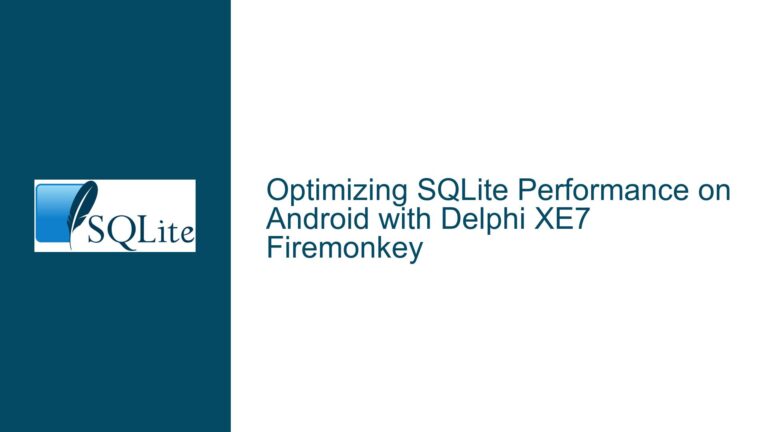Database Daemon Hangs During SQLite File Read Operations
System Process Freeze During SQLite Database Page Retrieval
A system daemon responsible for managing configuration data via SQLite experiences intermittent freezes during specific operational events. Stack traces reveal the process becomes stuck in low-level I/O operations like __pread(), unixRead(), and readDbPage(), indicating a stall during attempts to read database pages from disk into memory. The freeze manifests as 100% CPU utilization in userland with no progress in transaction execution, blocking all subsequent operations until manual intervention.
Key characteristics of the failure include:
- Persistent blocking at the OS pread() system call layer
- Chain of SQLite functions (moveToChild, sqlite3BtreeMovetoUnpacked, sqlite3VdbeExec) waiting indefinitely for data
- No visible errors or exceptions thrown by the application layer
- Event-specific triggers tied to high-concurrency write operations or large transactions
This behavior suggests a fundamental mismatch between SQLite’s locking expectations and the operating system’s file access guarantees, exacerbated by specific database access patterns.
Root Causes of SQLite Read Operation Deadlocks
1. File System Locking Contention
SQLite relies on POSIX advisory locks (Unix) or LockFileEx() (Windows) to coordinate concurrent access. When a daemon thread enters pread() to fetch a database page, it assumes exclusive access to the file descriptor. Conflicts arise when:
- NFS/CIFS Mounts: Network file systems often implement locking inconsistently. A write operation from another node may hold an unreleased lock, causing the local pread() to block indefinitely despite the remote process having terminated.
- File Descriptor Leaks: Orphaned child processes inheriting open database connections can retain locks after parent termination, creating phantom contention.
- Anti-Virus/Backup Tools: Real-time file scanners may briefly lock database files during scans, conflicting with long-running transactions.
2. I/O Subsystem Bottlenecks
The unixRead() and readDbPage() stack frames indicate direct interaction with the storage layer. Performance degradation or hardware faults in this layer manifest as:
- Disk Seek Latency: Mechanical disks struggling with random access patterns during B-tree traversals cause pread() to block excessively, mimicking a hang.
- Write-Back Cache Misdirection: Controllers falsely reporting data persistence (fsync() lies) create scenarios where SQLite proceeds under the illusion that writes have completed, leading to corrupted pages that stall subsequent reads.
- Page Cache Pressure: Under memory-constrained conditions, the OS page cache evicts database pages mid-transaction, forcing expensive disk re-reads that block progress.
3. SQLite Lock State Mismanagement
While the stack trace emphasizes read operations, underlying write conflicts often precipitate read stalls:
- Write-Ahead Log (WAL) Mode Misconfiguration: Without PRAGMA journal_mode=WAL, readers may block on schema modifications or pending writes due to rollback journal locks.
- STMT Journal Overflows: Large UPDATE/DELETE operations without adequate PRAGMA cache_size adjustments force temporary journals to spill to disk, holding exclusive locks during spill operations.
- Unbounded Transactions: Open transactions lacking explicit COMMIT/ ROLLBACK retain write locks, blocking subsequent reads that require schema access.
Diagnostic and Mitigation Strategies for Persistent Read Stalls
1. File System and Lock Analysis
Identify Contending Processes
lsof +D /path/to/database.sqlite
fuser -v /path/to/database.sqlite
Cross-reference output with process trees to detect zombie processes or unauthorized accessors. For NFS environments, use nfsiostat and rpcinfo to audit remote locks.
Validate Locking Primitive Behavior
/* SQLite snippet to force lock contention */
sqlite3_exec(db, "BEGIN EXCLUSIVE;", 0, 0, 0); /* Hold lock indefinitely */
Execute in a separate thread while monitoring strace -e trace=file,desc on the daemon to observe fcntl() interactions. Compare against expected lock states.
Filesystem Conformance Testing
Mount the database directory with noatime,relatime,nobarrier to minimize metadata updates. For ext4, enforce strict journaling:
tune2fs -o journal_data_ordered /dev/sdX
mount -o data=journaled /dev/sdX /path/to/db
Benchmark with sqlite3_analyzer to isolate filesystem-induced latency.
2. I/O Subsystem Hardening
Latency Profiling
iotop -aoP
blktrace -d /dev/sdX -o - | blkparse -i -
Correlate pread() hangs with disk queue depths and request patterns. For cloud instances, validate EBS throughput quotas and burst balance.
Controller Configuration
Disable write caching in environments lacking battery-backed cache modules:
hdparm -W0 /dev/sdX
For RAID arrays, force write-through caching via controller CLI:
Megacli -LDSetProp WT -LAll -aAll
WAL Mode Optimization
PRAGMA journal_mode=WAL;
PRAGMA wal_autocheckpoint=1000; /* Prevent WAL overgrowth */
PRAGMA busy_timeout=5000; /* Fail fast on contention */
Monitor WAL index/shared memory usage via sqlite3_wal_checkpoint_v2() to prevent heap fragmentation.
3. Application-Level Concurrency Controls
Statement Timeout Enforcement
/* C example using sqlite3_progress_handler() */
sqlite3_progress_handler(db, 1000, progress_callback, NULL);
Implement callback to invoke sqlite3_interrupt() after N steps, terminating runaway queries.
Connection Pool Tuning
Limit concurrent writers using semaphore-guarded pools:
sem_t db_sem;
sem_init(&db_sem, 0, 1); /* Allow 1 writer */
void write_operation() {
sem_wait(&db_sem);
sqlite3_exec(db, "BEGIN IMMEDIATE; ... COMMIT;", ...);
sem_post(&db_sem);
}
For readers, employ BEGIN DEFERRED and ATTACH ‘file:?mode=ro’ to minimize lock footprints.
Corruption Recovery Protocols
Integrate automatic integrity checks:
PRAGMA quick_check;
/* If failed: */
cp corrupted.db backup.db
sqlite3 corrupted.db ".recover" | sqlite3 repaired.db
Schedule via cron with alerting on checksum mismatches.
This systematic approach isolates locking, I/O, and concurrency factors contributing to daemon freezes. By coupling filesystem validation, storage hardening, and SQLite-specific optimizations, persistent hangs during pread() operations become diagnosable and preventable.

